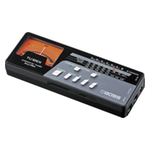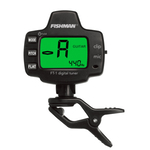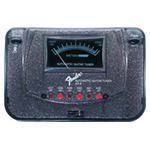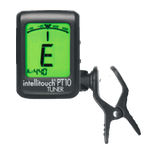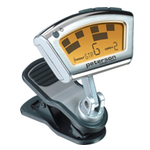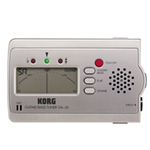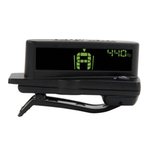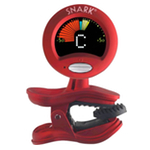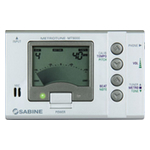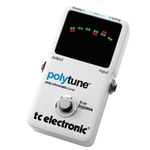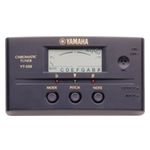Guitar Tuners
While it is important for instrumentalists to be able to tune their guitars by ear, without the aid of any electronic devices, the most accurate tuning is best accomplished by dedicated electronic tuners, the accuracy of which far exceeds even the most highly-developed human ear.
There are several different types of tuners available. Traditional tuners use a needle-based readout to indicate if a pitch is sharp or flat. More modern tuners will use digital LEDs in place of a needle or as a supplement. Generally, guitar and bass tuners provide both 1/4" input and microphones for acoustic instruments. In place of input-based tuners, several manufacturers now provide clip-on tuners that use the physical vibrations of the instrument itself to input the pitch-data to the tuners. Pedal-based tuners are also available, most of which mute the output signal so a player can tune quietly during live performance.
Traditionally, so-called Strobe tuners (tuners that use a stroboscope combined with mechanical readout) are considered the most accurate, though true Strobe tuners are rare and relatively expensive. Even inexpensive tuners provide good results, though very cheap tuners are at once unreliable and frustrating. The best decision is to buy a durable and moderately priced tuner than will stand the test of time.
There are several different types of tuners available. Traditional tuners use a needle-based readout to indicate if a pitch is sharp or flat. More modern tuners will use digital LEDs in place of a needle or as a supplement. Generally, guitar and bass tuners provide both 1/4" input and microphones for acoustic instruments. In place of input-based tuners, several manufacturers now provide clip-on tuners that use the physical vibrations of the instrument itself to input the pitch-data to the tuners. Pedal-based tuners are also available, most of which mute the output signal so a player can tune quietly during live performance.
Traditionally, so-called Strobe tuners (tuners that use a stroboscope combined with mechanical readout) are considered the most accurate, though true Strobe tuners are rare and relatively expensive. Even inexpensive tuners provide good results, though very cheap tuners are at once unreliable and frustrating. The best decision is to buy a durable and moderately priced tuner than will stand the test of time.








